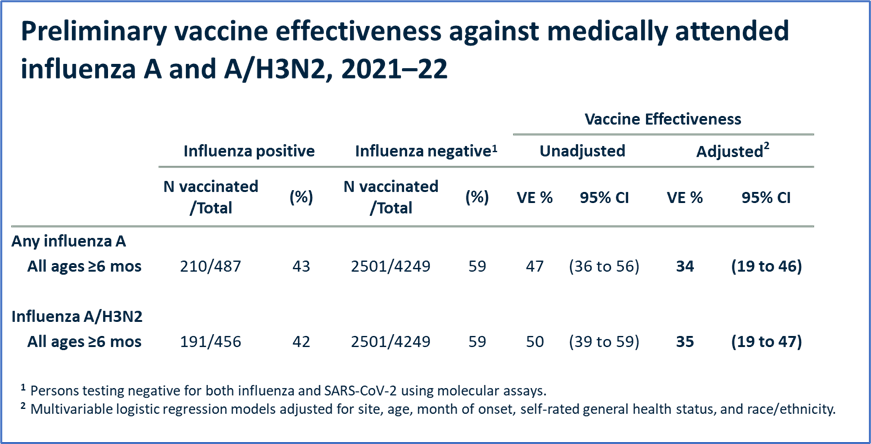ACIP Flu Meeting Update: Flu Vaccines Worked Better than Reported & ACIP Recommends Specific Vaccines For Seniors

June 23, 2022—New CDC data presented at the June 22, 2022 meeting of CDC’s Advisory Committee on Immunization Practices (ACIP) show flu vaccines worked better this past season than initially reported, reducing the risk of flu illness by about one-third among people who were vaccinated. Additionally, ACIP voted to preferentially recommend the use of specific flu vaccines for adults 65 years and older, including higher dose and adjuvanted flu vaccines. This recommendation must be approved by CDC’s Director to become policy.
Updated Flu Vaccine Effectiveness Estimates Show Benefit
CDC data from October 4, 2021, through April 30, 2022, showed that flu vaccines reduced people’s risk of mild to moderate flu illness caused by H3N2 flu viruses—the most common flu viruses this season—by 35 percent overall. CDC’s early season vaccine effectiveness estimates released in March were not statistically significant, suggesting vaccination did not offer benefit in reducing the risk of mild to moderate flu illness. The early data underestimated how well flu vaccines worked during the 2021-2022 flu season because of a small sample size and biases due to COVID-19. More flu data have since become available, and CDC has corrected for COVID-19 bias by excluding patients with COVID-19 illness from the comparison group.*

These updated estimates are similar to what has been seen during past H3N2-predominant seasons and are in line with initial agency expectations based on laboratory data. Estimates of how well flu vaccine protected against serious outcomes like hospitalization and ICU admission are pending. Flu vaccination has been shown in several studies to reduce severity of illness in people who get vaccinated but still get sick, reducing the risk of serious outcomes like hospitalization and death.
ACIP Recommends Specific Flu Vaccines for People 65 Years and Older
Also at the meeting, ACIP voted in favor of a preferential recommendation for certain flu vaccines over others for adults 65 years and older in the United States. ACIP voted to preferentially recommend the use of higher dose flu vaccines (Fluzone High-Dose vaccine and Flublok recombinant vaccine) or adjuvanted flu vaccine (Fluad vaccine) over standard-dose unadjuvanted flu vaccines. If one of these vaccines is not available at the time of administration, people in this age group should get a standard-dose flu vaccine instead. This recommendation was based on a review of available studies which suggests that, in this age group, these vaccines are potentially more effective than standard dose unadjuvanted flu vaccines. This recommendation must be approved by CDC’s Director to become policy.
In recent years, CDC has not recommended any one flu vaccine over another for any age group, and there is still no preferential recommendation for people younger than 65. CDC and ACIP will continue to review data on the comparative effectiveness of flu vaccines in different age groups as more information becomes available.
More information on the U.S. vaccines with a preferential recommendation for older adults:
- Fluzone High-Dose Quadrivalent is an inactivated influenza vaccine approved for use in people 65 years and older. It contains four times the antigen, the part of the vaccine that helps the body build up protection against flu viruses, compared to standard-dose inactivated flu vaccines. The higher dose of antigen is intended to give people 65 years and older a better immune response to vaccination, and therefore, better protection against flu.
- Fluad Quadrivalent is an adjuvanted inactivated influenza vaccine approved for use in people 65 years and older. It contains the same amount of antigen as other standard dose inactivated flu vaccines plus MF59 adjuvant. The adjuvant is intended to give people 65 years and older a better immune response to vaccination, and therefore, better protection against flu.
- Flublok Quadrivalent is a recombinant protein influenza vaccine approved for use in people 18 years and older. It is made using different production technology than the inactivated influenza vaccines and contains three times the antigen dose compared with standard-dose inactivated flu vaccines. The higher dose of antigen is intended to give people 65 years and older a better immune response to vaccination, and therefore, better protection against flu.
People 65 years and older have an increased risk of severe flu illness, hospitalization, and death compared with younger populations. Use of potentially more effective vaccines for older people can avert serious outcomes. Additionally, data has shown that racial and ethnic health disparities exist in populations that receive a high-dose flu vaccine compared with standard-dose flu vaccines.
Everyone 6 months and older should get an annual flu vaccine to best protect against flu and its potentially serious complications. This is especially true for people at higher risk of developing serious flu complications, including people 65 years and older, pregnant women, young children and people with certain chronic medical conditions. If you have questions about which vaccine is best for you, talk to your doctor or other health care professional.
# # #
*COVID-19 bias has also been described in studies from Clinical Infectious Diseases and the New England Journal of Medicine.